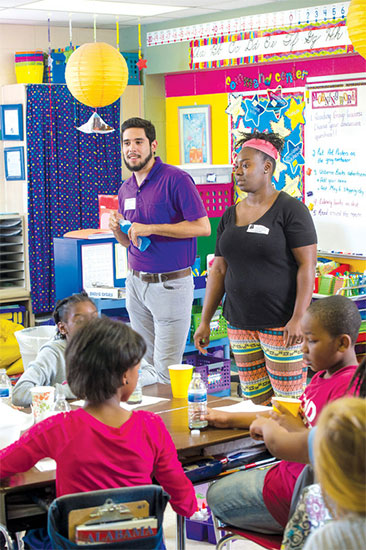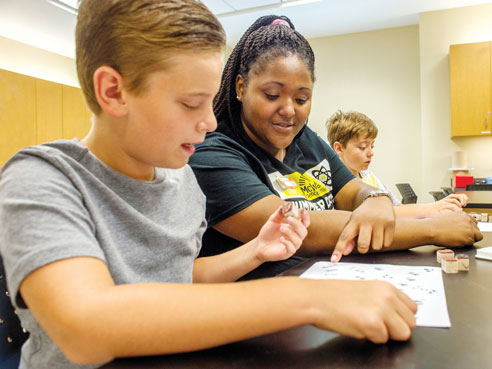Written by: Tiffany Westry
Need more info? Contact us
 UABTeach students Daniel Mendoza and Dessie Chandler guide students through a lesson at Rocky Ridge Elementary School.Preparing a new force of highly qualified science, technology, engineering and mathematics teachers to enter classrooms throughout Alabama is an ambitious initiative, and an increasing number of University of Alabama at Birmingham students are up for the challenge.
UABTeach students Daniel Mendoza and Dessie Chandler guide students through a lesson at Rocky Ridge Elementary School.Preparing a new force of highly qualified science, technology, engineering and mathematics teachers to enter classrooms throughout Alabama is an ambitious initiative, and an increasing number of University of Alabama at Birmingham students are up for the challenge.
In its third year, the UABTeach program has seen increased growth. This past fall, 142 students enrolled in the program’s introductory course, a 73 percent increase from the previous year. Fifty percent of those students moved on to Step 2 of the program.
“When you consider that many of these students had never thought about teaching before, this is incredibly encouraging,” said Lee Meadows, Ph.D., associate professor in the UAB School of Education and UABTeach co-director. Their on-campus training is centered around methods of inquiry-based learning, instead of traditional lecturing, which encourages students to explore and find answers on their own. Right out of the gate, our Step 1 course gives UABTeach students the opportunity to experience teaching by placing them in a fourth- or fifth-grade classroom with a partner. This offers students firsthand exposure to teaching to see if it’s a good fit for them.”
UABTeach is the only program of its kind in Alabama. It allows undergraduate students with STEM majors to simultaneously receive both a degree in their declared major and a full teaching certification to teach at the high school level in just four years. The popularity of the program among students has resulted in the addition of students majoring in neuroscience, biomedical sciences, chemical education and mathematical reasoning to become eligible to enroll in the program.
“We believe collaboration has been a significant driver of the increased interest and success of the program,” said Adam Roderick, academic coach and program enhancement specialist. “Our partnerships with UAB Admissions, Enrollment Management, student advisers and other UAB offices across campus have enabled us to cast a wide net for prospective students. Our partnerships with area school systems and superintendents have also allowed us to cast a wide net for teachers to serve as mentors.”
UABTeach is a partnership between the School of Education, the College of Arts and Sciences, the School of Engineering, the School of Health Professions, and the Alabama State Department of Education, as well as the Birmingham, Hoover, Homewood and Jefferson County school districts. Student participants receive tuition scholarships for initial UABTeach-related courses. The first two courses of the program are fully reimbursed to students if they pass, and Step 1 of the program also counts as a First-Year Experience class, which is required for all undergraduates.
 UABTeach student Kristen Bates works on a lesson about animals with middle-school camper at McWane Science Center.The benefits of the program are wide-reaching. Those enrolled in UABTeach are trained by master teachers, who also happen to be some of the state’s most highly qualified educators. Master teachers are nontenured clinical faculty members who have numerous years of experience teaching in school districts throughout central Alabama. As a result of the program’s growth, UABTeach welcomed two new master teachers in 2016.
UABTeach student Kristen Bates works on a lesson about animals with middle-school camper at McWane Science Center.The benefits of the program are wide-reaching. Those enrolled in UABTeach are trained by master teachers, who also happen to be some of the state’s most highly qualified educators. Master teachers are nontenured clinical faculty members who have numerous years of experience teaching in school districts throughout central Alabama. As a result of the program’s growth, UABTeach welcomed two new master teachers in 2016.
Students also receive support from UABTeach mentor-teachers, who are highly qualified and effective elementary, middle and high school teachers who allow students into their classrooms to gain firsthand experience in working with students. Mentors earn a stipend, receive free professional development, network with other mentors, and most importantly, assist in the preparation of the next generation of STEM educators by collaborating on lesson topics, reviewing lesson plans and providing feedback about their teaching performance.
Thirty mentor teachers were added to the program in 2016 thanks to support from the Community Foundation of Greater Birmingham. UABTeach is the recipient of one of the largest grants awarded by the foundation in the past five years. The increase in mentors resulted in 95 percent of UABTeach students’ being active in a local classroom during the fall semester. The program hopes to establish additional partnerships with high school teachers.
| “Our future teachers are going to be much more powerful and effective if they are able to interact with teachers who are successful in what they are doing and thinking about the future. UABTeach strengthens this process by providing professional development to mentor-teachers in the program.” |
“Mentor-teachers serve an important role in the UABTeach program,” said John Mayer, Ph.D., professor and UABTeach co-director. “Our future teachers are going to be much more powerful and effective if they are able to interact with teachers who are successful in what they are doing and thinking about the future. UABTeach strengthens this process by providing professional development to mentor-teachers in the program.”
While training remains robust, teacher certification is expedited, increasing the STEM teacher pool for the state, an area in which school districts are experiencing significant shortages. The expedited certification also gives students additional options for employment upon graduation. As part of the certification process, UAB students wishing to pursue teaching must be admitted to the Teacher Education Program. In 2016, UABTeach celebrated a major milestone with 16 students’ being admitted in its Teacher Education Program. The first cohort, a total of four students, will graduate from UABTeach in spring 2017. By spring 2018, the program expects the number of students’ graduating to reach double digits.
“Our goal is to have 30-40 graduates of the program each year,” Meadows said. “Our numbers show that roughly 50 percent of students in the program are from central Alabama, and recent research shows that up to 80 percent of newly certified teachers go back to teach in their hometowns. Over time, we believe this sustained effort will have a substantial impact on education in the state of Alabama.”
Initial funding for UABTeach came in 2014 from the National Math and Science Initiative through a $1.45 million grant from the Howard Hughes Medical Institute. Subsequent philanthropic support from the Max and Lorayne Cooper Foundation and The Belk Foundation has helped drive the success of the program. Additional support from community partners has helped to provide students with teaching-oriented, paid internship opportunities with organizations like the Birmingham Zoo, McWane Science Center, the Birmingham Botanical Gardens and Jones Valley Teaching Farm.
UABTeach is based on UTeach, a program that began in 1997 at the University of Texas at Austin to better prepare and increase the number of certified STEM teachers in that state. The program proved so successful that the UTeach Institute was established in 2006 to support program replication across the nation. Currently, 44 universities throughout the United States are implementing UTeach programs; in spring 2015, more than 2,000 students graduated from these programs collectively.